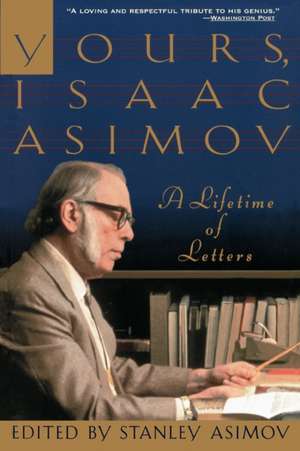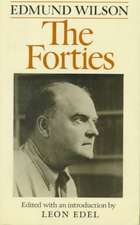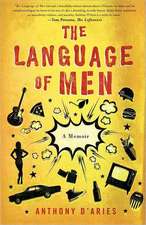Yours, Isaac Asimov: A Lifetime of Letters
Autor Isaac Asimoven Limba Engleză Paperback – 30 noi 1996
For Asimov's younger brother, veteran newspaperman Stanley Asimov, the creation of Yours, Isaac Asimov was truly a labor of love. Completed before Stanley's death in August 1995, the book is made up of excerpts from one thousand never-before-published letters, each handpicked by Stanley for inclusion in this volume. Arranged by subject and accompanied by Stanley's short, insightful introductions, here are letters to statesmen and scientists, actors and authors, as well as to children, housewives, aspiring writers, and fans the world over. The letters are warm, engaging, reasoned, and occasionally impassioned. Through them all Isaac Asimov's legendary genius, wit, and charm shine through.
And so we have Yours, Isaac Asimov: A Lifetime of Letters, an intimate glimpse into the thoughts, feelings, and opinions of a great writer and thinker of the modern age. As Stanley Asimov advised, "Read the letters carefully. One of them may have been written to you."
Preț: 120.05 lei
Nou
Puncte Express: 180
Preț estimativ în valută:
22.97€ • 24.05$ • 19.01£
22.97€ • 24.05$ • 19.01£
Carte disponibilă
Livrare economică 17-31 martie
Preluare comenzi: 021 569.72.76
Specificații
ISBN-13: 9780385476249
ISBN-10: 0385476248
Pagini: 352
Dimensiuni: 154 x 232 x 21 mm
Greutate: 0.53 kg
Editura: Main Street Books
ISBN-10: 0385476248
Pagini: 352
Dimensiuni: 154 x 232 x 21 mm
Greutate: 0.53 kg
Editura: Main Street Books
Extras
b>Chapter 4
Typewriters, Word Processors and Computers
Isaac loved his typewriters. Only rarely did they let him down.
30 July 1969
Last weekend, my Selectric IBM typewriter went awry just after IBM service shut down for that weekend. It hit me at 5:30 P.M. With a great deal of self-congratulation, I pushed the typewriter aside and got my backup.
About a year ago, I had paid $500 to get a second identical typewriter with an identical typeface so that when repairs were needed on one, I could use the second. I went right on, scarcely missing a stroke.
Then on Saturday, my backup typewriter went awry, and you should have heard the howl that rent the heavens when that happened. I spent the whole Sunday with two, count them, two, superbly expensive typewriters out of whack.
Even on Monday I couldn't get a repairman till 1 P.M. At 10 A.M., the doorbell rang and I ran down, expecting the guy from IBM. It was a reporter from the New York Times come to interview me--and I said sourly, "Oh, it's you."
That's no way to speak to a Times reporter. I had lots of explaining to do. Fortunately, he was good-humored about it. The repairman came at 1 P.M., administered oxygen to me and repairs to the machines.
25 October 1979
I'm a loner and a semi-recluse, and the only way I can work is as a one-person organization. Well, two, counting my typewriter.
20 May 1980
My IBM Selectric II typewriter is used every day all day. Counting first draft, second draft, correspondence, I should judge I type about 150,000 words a month.
20 December 1980
You bet I personally use the typewriter. This is coming to you on my new Selectric III (albeit one with an old-fashioned ribbon and no correcting feature, because I can't afford to stop to correct. From me they get strikeovers).
27 October 1989
I have been using a word processor since 1981, but I have never abandoned my typewriter, on which I am writing this letter.
But his trusty typewriter needed a ribbon, and Isaac hated to change them even when the print got very light.
21 May 1988
Gee, I need a new typewriter ribbon. When I was a teenager, new ribbons cost 50 cents. And I never had 50 cents. So I had to keep using old ones as long as possible. Now they cost a lot more than 50 cents. But I have lots of money and can easily buy them by the dozen and change them frequently. Old habits die hard. I still have "poor" habits.
23 March 1990
The ribbons on both my typewriter and my printer are growing dim. It is sickening. They don't make ribbons for someone like me who types day and night every day.
7 April 1989
What people should invent is a permanent ribbon that never has to be changed. If we can put a man on the Moon....
For all his reputation as a futurist Isaac was slow in accepting the use of the word processors. He loved his typewriters.
24 June 1980
I use an electric razor and a color television. However, I hang back from word processing. I'm afraid it would cut down my production.
It would make revision and editing easier, and I would possibly fall prey to both. At the present moment, editing and revision are so difficult on an ordinary typewriter that I have learned to keep both to an absolute minimum. What appears in print is generally the first (or nearly first) careless rapture. If I begin to fall into the habit of polishing I may lose in both quantity and quality.
17 June 1981
I have a word processor in the apartment and am trying to learn how to use it. It's slow going. At my age, learning new ways isn't so easy.
25 June 1981
The word processor slows me up. But I suppose with time, it may make things easier for me. I don't know. In the last analysis, my brain is still the thing that has to make up everything and arrange the words. No matter what the word processor does, it's only a tool and the same philosophically as a pencil.
An article that he wrote for SciQuest magazine was the first that he created on the word processor. He sent it to the editor with this note:
3 August 1981
I have been using my new word processor for a month now to correct and print items whose first drafts were produced on my typewriter. This is the FIRST piece that was actually composed on the word processor I estimate I saved 15 minutes but there was much more tension. I guess, though, that tension will subside with practice. Also, you've got it without typos.
Eventually, Isaac became a little more comfortable with the word processor.
9 March 1984
As for word processors, I use one. It is a Radio Shack TRS-80. I've been using it for nearly four years, and I am completely pleased with it. I only use it for short essays and for final copies of long essays and books. For the first drafts of the latter, and for correspondence and miscellaneous work, I still use my trusty typewriter.
20 June 1984
The computer hasn't affected my writing. It has speeded it up a little bit in some ways, and it turns out cleaner copy. But I still use my typewriter a lot (I'm using it for this letter), and I intend to continue using it.
It hasn't affected my research techniques or my style. There's no way it could possibly affect my productivity because long ago my rate of thinking became the bottleneck. (Thank heaven, my rate of thinking is very high.)
What about computers in general?
8 June 1978
Despite the fact that I write on computers and robots in science fiction and occasionally in science fact, my knowledge of the nuts and bolts of the subject is virtually nil.
22 October 1984
We will never be replaced by computers because they do things we're no good at (playing with figures and symbols deductively). And they can't do things we're good at (guessing, imagining, fantasying, intuiting and other inductive games). I can't conceivably program a computer to write my stories because I don't know how I write them myself.
Even the fax machine baffled him.
1 June 1990
I have trouble figuring out how to use the fax machine. (I am the world's biggest klutz in such things.) Fortunately, I do know how to drop an envelope in a mail slot.
Isaac was once asked if he thought computer disks would replace books. He replied:
19 January 1985
I have written about computers now for 30 years. But I don't think books will be eliminated in favor of computer disks. I can carry a book in my jacket pocket and read it while standing in a supermarket checkout line. Tell me what to do with a computer disk under such circumstances. Besides, anyone who has stared at a book for three hours and at a TV screen for three hours knows which is more relaxing.
Chapter 45: Being a Liberal
Politically, Isaac was a liberal--and proud of it.
31 August 1968
I'm a New Deal Democrat who believes in soaking the rich, even when I'm the rich. But I can't stand the thought that it's going for the war in Vietnam instead of for the slums, for conservation, for un-pollution and so on.
12 February 1981
I was a great admirer of FDR when he was alive. I voted for him in 1944, and I revere his memory.
3 December 1981
The "Moral Majority" (so called) is a deadly enemy to science and to free thought. I think that, at the moment, they are more powerful and more dangerous than people calling themselves Nazis.
23 November 1982
I'm a lifelong liberal, and I get uneasy when "liberal" is used as a dirty word.
Representative Newt Gingrich, the conservative Republican congressman from Georgia who is now Speaker of the House, was one of Isaac's fans. In December 1982 he visited Isaac in New York at Isaac's apartment. Several months later, Gingrich sent Isaac an advance copy of a letter that he was distributing about what Gingrich called a Second Millennium project. He asked Isaac's opinion of the letter. Isaac wrote Gingrich this reply:
18 June 1983
The letter is fine. But if you're going to rally the people of the world, for goodness' sake, you must place yourself above partisan politics. Resist poking fun at "liberal Democrats." There are a lot of them who might be on your side if you can avoid deliberately antagonizing them.
You were quoted in the New York Times as saying that for liberal Democrats to stand in horror at a budget deficit is like a saloonkeeper favoring Prohibition (or words to that effect).
Well, considering that no Democrat ever had a deficit even half as big as Reagan's, it is certainly peculiar that conservative Republicans who routinely faint at $20 billion Democratic deficits are cheerful as Punch at a $200 billion Republican deficit. It's like a hard-shell Baptist preacher getting drunk and chasing girls.
In his later years, he became a spokesman for a number of liberal organizations.
28 February 1986
I am president of the American Humanist Association and fundraising letters have gone out over my name for the AHA, the Americans for Democratic Action and the American Civil Liberties Union. In other words, I am an outspoken liberal Democrat, and I am hissed by the Radical Right. Personally, I am delighted to have the crackpots of the Right mad at me.
As much as Isaac disliked America's Republican Presidents, he liked the Democratic candidates who lost to them. Here's a letter to Walter Mondale:
15 October 1984
In a way, you can't lose. You will, at worst, join the list of candidates who have been the better people even though they come in second. You will be remembered as, for instance, Adlai Stevenson and Hubert Humphrey (both Democrats, of course) are remembered--as Presidents America was not shrewd enough to deserve.
Virtually everyone would be extremely honored to be invited to the White House for dinner. But not Isaac when the President was Ronald Reagan. He did not like Reagan or his policies. He told friends and family that he would feel like a hypocrite if he accepted such an invitation. In 1984 and 1986, he received invitations. But Isaac respected the presidency. So here is a declination that is the model of decorum.
7 March 1984
I am greatly honored that my wife and I are invited to dinner on April 10, 1984, on the occasion of the visit of His Excellency, the President of the Dominican Republic.
It is with regret that I am compelled to inform you that I am unable to be in Washington that day and must therefore decline the invitation.
Isaac was a strong opponent of the Vietnam War.
18 May 1965
The bombing of North Vietnam has been stopped since its continuation was getting us nowhere but world unpopularity. It would take us 120 planes to bomb out two trucks, a price the North Vietnamese could well afford to pay for the terrific propaganda beating they were handing us in the world at large.
The slogan "my country, right or wrong" is not so bad. You can forgive your country being wrong. What about a new slogan, "my country, smart or stupid." It is hard to forgive stupidity. Napoleon once had a political enemy kidnapped from neutral territory. The furor that followed led Talleyrand to remark, "It is worse than a crime; it is a blunder."
27 October 1967
Some protesters against the Vietnam War plan to refuse to pay the 10% surtax if it is passed by Congress despite the risk of jail. (I am not one of these; I don't have the bravery to risk jail.) However, I would be greatly impressed if there were a solid movement on the part of the war-approvers to pay the 10% surtax voluntarily if Congress doesn't pass it.
Such a substitution of the pocketbook for the mouth would so impress me with the dedication of the American people in favor of this war that I would suspend my opposition to it.
4 December 1967
The United States would be considered a villain by some no matter what it did. But many of its actions in Vietnam are villainous by our own standards as applied to other people fighting their wars.
Non-Americans may fail to see the force of the argument: "Well, it's all right when we do it." Nor would they see the force that our conception of our national security justifies all. That argument would have justified Hitler.
7 February 1968
I hope recent events in Vietnam have penetrated the thick skulls in Washington, but somehow I doubt it. Given the choice of admitting a mistake or ruining the world, it's ruin by a length and a half.
In 1986, Isaac was asked whether he would write a short essay on what the United States learned from the Vietnam War. He declined.
23 August 1986
I don't consider myself an expert on the subject, and I don't want to be wise after the event. So I'll leave the punditing to others.
Besides, it's my candid opinion that my entire essay could be written as follows: "We have learned nothing from Vietnam."
The short Reagan foray into Lebanon was even more farcical and disgraceful than Vietnam was. And Reagan's mad panting for Nicaraguan blood will come to no good. Of course, if we can find enemies small enough, we can flex our muscles safely. We managed Grenada, and I suggest the next target be Monaco.
Isaac believed in the need for world peace and good relations with the Soviet Union.
29 July 1964
If anyone asks me if I'm for coexistence with the U.S.S.R., my answer is yes! What do they want? Nuclear war? We're coexisting with Russia right now, and we have to keep it up or we're all dead.
18 November 1965
My greatest desire is that the day will come when all suspicion and unfriendliness between the United States and the Soviet Union will cease, and we (and the rest of the world, too) will live together in brotherhood and peace.
20 February 1982
I would like to see a government in the United States and in the Soviet Union which will combine to destroy all nuclear weapons and to agree to a policy of external peace.
19 October 1985
The need for peace in the world today is so overwhelmingly great and the consequences of war are so overwhelmingly evil, that all good people should unite in preaching the need for peace. In this great cause, we can all of us find common ground.
1 October 1986
I think the continuation of truly independent nations is an impossible concept from here on in. The world is a single economic unit, and I think we'll have a global society by 2087 with the United States the cutting edge, I hope. But it won't be the old-fashioned U.S. we know.
9 December 1986
The desirability of peace and justice and freedom and security remain values I would keep forever. The nation-state is obsolete. We need a federalized world government.
An ideal 21st century is one in which computers and robots do routine work, a space-centered society is developed to the fullest along peaceful paths and a cooperating world tackles the real problems of humanity. What should we do? Reduce arms to a minimum and cultivate friendship and cooperation amo
Typewriters, Word Processors and Computers
Isaac loved his typewriters. Only rarely did they let him down.
30 July 1969
Last weekend, my Selectric IBM typewriter went awry just after IBM service shut down for that weekend. It hit me at 5:30 P.M. With a great deal of self-congratulation, I pushed the typewriter aside and got my backup.
About a year ago, I had paid $500 to get a second identical typewriter with an identical typeface so that when repairs were needed on one, I could use the second. I went right on, scarcely missing a stroke.
Then on Saturday, my backup typewriter went awry, and you should have heard the howl that rent the heavens when that happened. I spent the whole Sunday with two, count them, two, superbly expensive typewriters out of whack.
Even on Monday I couldn't get a repairman till 1 P.M. At 10 A.M., the doorbell rang and I ran down, expecting the guy from IBM. It was a reporter from the New York Times come to interview me--and I said sourly, "Oh, it's you."
That's no way to speak to a Times reporter. I had lots of explaining to do. Fortunately, he was good-humored about it. The repairman came at 1 P.M., administered oxygen to me and repairs to the machines.
25 October 1979
I'm a loner and a semi-recluse, and the only way I can work is as a one-person organization. Well, two, counting my typewriter.
20 May 1980
My IBM Selectric II typewriter is used every day all day. Counting first draft, second draft, correspondence, I should judge I type about 150,000 words a month.
20 December 1980
You bet I personally use the typewriter. This is coming to you on my new Selectric III (albeit one with an old-fashioned ribbon and no correcting feature, because I can't afford to stop to correct. From me they get strikeovers).
27 October 1989
I have been using a word processor since 1981, but I have never abandoned my typewriter, on which I am writing this letter.
But his trusty typewriter needed a ribbon, and Isaac hated to change them even when the print got very light.
21 May 1988
Gee, I need a new typewriter ribbon. When I was a teenager, new ribbons cost 50 cents. And I never had 50 cents. So I had to keep using old ones as long as possible. Now they cost a lot more than 50 cents. But I have lots of money and can easily buy them by the dozen and change them frequently. Old habits die hard. I still have "poor" habits.
23 March 1990
The ribbons on both my typewriter and my printer are growing dim. It is sickening. They don't make ribbons for someone like me who types day and night every day.
7 April 1989
What people should invent is a permanent ribbon that never has to be changed. If we can put a man on the Moon....
For all his reputation as a futurist Isaac was slow in accepting the use of the word processors. He loved his typewriters.
24 June 1980
I use an electric razor and a color television. However, I hang back from word processing. I'm afraid it would cut down my production.
It would make revision and editing easier, and I would possibly fall prey to both. At the present moment, editing and revision are so difficult on an ordinary typewriter that I have learned to keep both to an absolute minimum. What appears in print is generally the first (or nearly first) careless rapture. If I begin to fall into the habit of polishing I may lose in both quantity and quality.
17 June 1981
I have a word processor in the apartment and am trying to learn how to use it. It's slow going. At my age, learning new ways isn't so easy.
25 June 1981
The word processor slows me up. But I suppose with time, it may make things easier for me. I don't know. In the last analysis, my brain is still the thing that has to make up everything and arrange the words. No matter what the word processor does, it's only a tool and the same philosophically as a pencil.
An article that he wrote for SciQuest magazine was the first that he created on the word processor. He sent it to the editor with this note:
3 August 1981
I have been using my new word processor for a month now to correct and print items whose first drafts were produced on my typewriter. This is the FIRST piece that was actually composed on the word processor I estimate I saved 15 minutes but there was much more tension. I guess, though, that tension will subside with practice. Also, you've got it without typos.
Eventually, Isaac became a little more comfortable with the word processor.
9 March 1984
As for word processors, I use one. It is a Radio Shack TRS-80. I've been using it for nearly four years, and I am completely pleased with it. I only use it for short essays and for final copies of long essays and books. For the first drafts of the latter, and for correspondence and miscellaneous work, I still use my trusty typewriter.
20 June 1984
The computer hasn't affected my writing. It has speeded it up a little bit in some ways, and it turns out cleaner copy. But I still use my typewriter a lot (I'm using it for this letter), and I intend to continue using it.
It hasn't affected my research techniques or my style. There's no way it could possibly affect my productivity because long ago my rate of thinking became the bottleneck. (Thank heaven, my rate of thinking is very high.)
What about computers in general?
8 June 1978
Despite the fact that I write on computers and robots in science fiction and occasionally in science fact, my knowledge of the nuts and bolts of the subject is virtually nil.
22 October 1984
We will never be replaced by computers because they do things we're no good at (playing with figures and symbols deductively). And they can't do things we're good at (guessing, imagining, fantasying, intuiting and other inductive games). I can't conceivably program a computer to write my stories because I don't know how I write them myself.
Even the fax machine baffled him.
1 June 1990
I have trouble figuring out how to use the fax machine. (I am the world's biggest klutz in such things.) Fortunately, I do know how to drop an envelope in a mail slot.
Isaac was once asked if he thought computer disks would replace books. He replied:
19 January 1985
I have written about computers now for 30 years. But I don't think books will be eliminated in favor of computer disks. I can carry a book in my jacket pocket and read it while standing in a supermarket checkout line. Tell me what to do with a computer disk under such circumstances. Besides, anyone who has stared at a book for three hours and at a TV screen for three hours knows which is more relaxing.
Chapter 45: Being a Liberal
Politically, Isaac was a liberal--and proud of it.
31 August 1968
I'm a New Deal Democrat who believes in soaking the rich, even when I'm the rich. But I can't stand the thought that it's going for the war in Vietnam instead of for the slums, for conservation, for un-pollution and so on.
12 February 1981
I was a great admirer of FDR when he was alive. I voted for him in 1944, and I revere his memory.
3 December 1981
The "Moral Majority" (so called) is a deadly enemy to science and to free thought. I think that, at the moment, they are more powerful and more dangerous than people calling themselves Nazis.
23 November 1982
I'm a lifelong liberal, and I get uneasy when "liberal" is used as a dirty word.
Representative Newt Gingrich, the conservative Republican congressman from Georgia who is now Speaker of the House, was one of Isaac's fans. In December 1982 he visited Isaac in New York at Isaac's apartment. Several months later, Gingrich sent Isaac an advance copy of a letter that he was distributing about what Gingrich called a Second Millennium project. He asked Isaac's opinion of the letter. Isaac wrote Gingrich this reply:
18 June 1983
The letter is fine. But if you're going to rally the people of the world, for goodness' sake, you must place yourself above partisan politics. Resist poking fun at "liberal Democrats." There are a lot of them who might be on your side if you can avoid deliberately antagonizing them.
You were quoted in the New York Times as saying that for liberal Democrats to stand in horror at a budget deficit is like a saloonkeeper favoring Prohibition (or words to that effect).
Well, considering that no Democrat ever had a deficit even half as big as Reagan's, it is certainly peculiar that conservative Republicans who routinely faint at $20 billion Democratic deficits are cheerful as Punch at a $200 billion Republican deficit. It's like a hard-shell Baptist preacher getting drunk and chasing girls.
In his later years, he became a spokesman for a number of liberal organizations.
28 February 1986
I am president of the American Humanist Association and fundraising letters have gone out over my name for the AHA, the Americans for Democratic Action and the American Civil Liberties Union. In other words, I am an outspoken liberal Democrat, and I am hissed by the Radical Right. Personally, I am delighted to have the crackpots of the Right mad at me.
As much as Isaac disliked America's Republican Presidents, he liked the Democratic candidates who lost to them. Here's a letter to Walter Mondale:
15 October 1984
In a way, you can't lose. You will, at worst, join the list of candidates who have been the better people even though they come in second. You will be remembered as, for instance, Adlai Stevenson and Hubert Humphrey (both Democrats, of course) are remembered--as Presidents America was not shrewd enough to deserve.
Virtually everyone would be extremely honored to be invited to the White House for dinner. But not Isaac when the President was Ronald Reagan. He did not like Reagan or his policies. He told friends and family that he would feel like a hypocrite if he accepted such an invitation. In 1984 and 1986, he received invitations. But Isaac respected the presidency. So here is a declination that is the model of decorum.
7 March 1984
I am greatly honored that my wife and I are invited to dinner on April 10, 1984, on the occasion of the visit of His Excellency, the President of the Dominican Republic.
It is with regret that I am compelled to inform you that I am unable to be in Washington that day and must therefore decline the invitation.
Isaac was a strong opponent of the Vietnam War.
18 May 1965
The bombing of North Vietnam has been stopped since its continuation was getting us nowhere but world unpopularity. It would take us 120 planes to bomb out two trucks, a price the North Vietnamese could well afford to pay for the terrific propaganda beating they were handing us in the world at large.
The slogan "my country, right or wrong" is not so bad. You can forgive your country being wrong. What about a new slogan, "my country, smart or stupid." It is hard to forgive stupidity. Napoleon once had a political enemy kidnapped from neutral territory. The furor that followed led Talleyrand to remark, "It is worse than a crime; it is a blunder."
27 October 1967
Some protesters against the Vietnam War plan to refuse to pay the 10% surtax if it is passed by Congress despite the risk of jail. (I am not one of these; I don't have the bravery to risk jail.) However, I would be greatly impressed if there were a solid movement on the part of the war-approvers to pay the 10% surtax voluntarily if Congress doesn't pass it.
Such a substitution of the pocketbook for the mouth would so impress me with the dedication of the American people in favor of this war that I would suspend my opposition to it.
4 December 1967
The United States would be considered a villain by some no matter what it did. But many of its actions in Vietnam are villainous by our own standards as applied to other people fighting their wars.
Non-Americans may fail to see the force of the argument: "Well, it's all right when we do it." Nor would they see the force that our conception of our national security justifies all. That argument would have justified Hitler.
7 February 1968
I hope recent events in Vietnam have penetrated the thick skulls in Washington, but somehow I doubt it. Given the choice of admitting a mistake or ruining the world, it's ruin by a length and a half.
In 1986, Isaac was asked whether he would write a short essay on what the United States learned from the Vietnam War. He declined.
23 August 1986
I don't consider myself an expert on the subject, and I don't want to be wise after the event. So I'll leave the punditing to others.
Besides, it's my candid opinion that my entire essay could be written as follows: "We have learned nothing from Vietnam."
The short Reagan foray into Lebanon was even more farcical and disgraceful than Vietnam was. And Reagan's mad panting for Nicaraguan blood will come to no good. Of course, if we can find enemies small enough, we can flex our muscles safely. We managed Grenada, and I suggest the next target be Monaco.
Isaac believed in the need for world peace and good relations with the Soviet Union.
29 July 1964
If anyone asks me if I'm for coexistence with the U.S.S.R., my answer is yes! What do they want? Nuclear war? We're coexisting with Russia right now, and we have to keep it up or we're all dead.
18 November 1965
My greatest desire is that the day will come when all suspicion and unfriendliness between the United States and the Soviet Union will cease, and we (and the rest of the world, too) will live together in brotherhood and peace.
20 February 1982
I would like to see a government in the United States and in the Soviet Union which will combine to destroy all nuclear weapons and to agree to a policy of external peace.
19 October 1985
The need for peace in the world today is so overwhelmingly great and the consequences of war are so overwhelmingly evil, that all good people should unite in preaching the need for peace. In this great cause, we can all of us find common ground.
1 October 1986
I think the continuation of truly independent nations is an impossible concept from here on in. The world is a single economic unit, and I think we'll have a global society by 2087 with the United States the cutting edge, I hope. But it won't be the old-fashioned U.S. we know.
9 December 1986
The desirability of peace and justice and freedom and security remain values I would keep forever. The nation-state is obsolete. We need a federalized world government.
An ideal 21st century is one in which computers and robots do routine work, a space-centered society is developed to the fullest along peaceful paths and a cooperating world tackles the real problems of humanity. What should we do? Reduce arms to a minimum and cultivate friendship and cooperation amo
Descriere
In addition to his enormous body of published works of fiction and nonfiction, Isaac Asimov was a prolific correspondent. During his professional career he received more than 100,000 letters, 90,000 of which he answered. Lovingly compiled and edited by his younger brother, Stanley, this collection of Isaac Asimov's letters affords readers a rare glimpse into the life of one of America's most celebrated writers.










